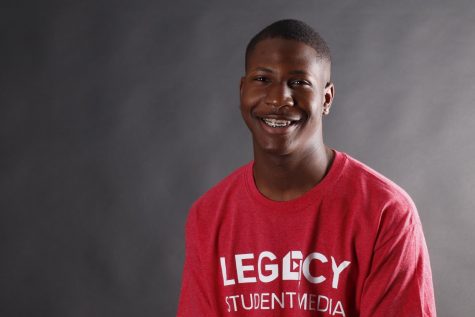As Cameron Charles walks through the halls, he overhears a group of kids talking. The N-word slips out of their mouths and he realizes they are white. Shocked, he keeps walking and sinks into his thoughts.
Negro: “a member of a dark-skinned group of peoples originally native to Africa south of the Sahara”. The definition shouldn’t be something to get offended by, but as slavery in the 16th century became common, this word took new and derogatory meaning. The word was used to demean and discourage a race of people just because of the way they looked.
“I think it should be labeled as a bad word, but when we (black people) say nigga that’s how we greet each other,” Charles said. “We know it has two meanings to it.”
Veiled skin, big noses, big lips, small eyes, lanky bodies, and nappy hair offended white men of the 16th century. Soon, black people’s existences were reduced to the size of a word. At first, Americans referred to blacks as “niggas” to merely label them – not to degrade them. But as slavery became common, black faces were associated with bondage, and thus the birth of the derogatory term. By the 1800s, the word was officially considered a socially acceptable insult.
In the 1950’s, American civilization was booming with innovation and excited fear; people of color were finally seeing a change in society. Many black people lived content lives, trying to survive in a country that seemed to be made for everyone except for the ones who helped construct it. Within those closed and alienated parts of America were colored people. Throughout this era, many black people were harassed with the N-word, but black people took the word that was used to degrade their existence and re-defined their individuality. Sean Darby, 10, thinks that it’s important for black people to reclaim their identity.
“Once used casually, it disseminates the meaning,” Sean Darby said. “It’s good that it’s being reclaimed.”
Fast forward to the late 60’s, when the Black Panther Party was created and thrived in Californian-black neighborhoods. They patrolled and protected black people from police brutality. In the midst of all their activism, they continued to identify themselves as Negros – not because they wanted to, but because that’s what the world had labeled them. They were born into this word. It was also through this movement that the word encountered a positive metamorphosis. People began calling their friends, family members, neighbors and themselves Negros. For one of the first times in history, black people embraced this word instead of feeling ashamed of it. Words have the ability to develop and take a new form. Khloi Charles, 10, believes that the word has become a safe haven for those who identify with it.
“They say it as a term of endearment,” Charles said. “A lot of people in my family say it.”
In the 1970’s, hip-hop was created within colored communities. Rappers like Biggie Smalls, Tupac and Ice Cube would eventually become pioneers for the casualty of the N-word. Their record labels questioned their lyrics, but the word meant something to them. The word carries both negative and positive connotation that one who has no experience with the word could never understand or empathize with. Chloe Johnson, 10, believes it’s unacceptable for white people to say it.
“They lost the privilege,” Johnson said. “They used it every time black people were raped, lynched, and spat upon.”
Students of Legacy were polled to determine how they felt about the power of “the n-word.” 33 out of 100 people thought that it was okay for black people to use the word. The rest thought that “It’s derogatory”, or that “It’s not my place to say.” Danielle Panzarella, English teacher at Legacy, feels indifferent about why black people use the word.
“It’s easy for me as a white person to say ‘no’,” Ms. Panzarella said. “Because of my perspective.”
People are allowed to be whoever they want. But it takes courage to be who you are called to be. Black people have no choice but to embody their shades of black. Angela Julias believes that people shouldn’t become ignorant of the original intent behind the word.
“It sends a confusing message to other people,” Julias said. “We need to promote each other.”
Opinions play a big part in America’s society, and culture will always shape itself into mankind’s reflection – emulating its actions and decisions. In 2018, people are desensitized towards others’ perspectives, lives, and feelings. Currently, the N-word affects our world whether we know it or not. It affects the way black people identify themselves and where they find their place in the world. Shelene Anderson finds hope in our generation and believes society will become less desensitized.
“Our country has an ugly past, there were a lot of people who fought for civil rights,” Ms. Anderson said. “[They] died nasty- horrible deaths to not be called that (negroe).”




